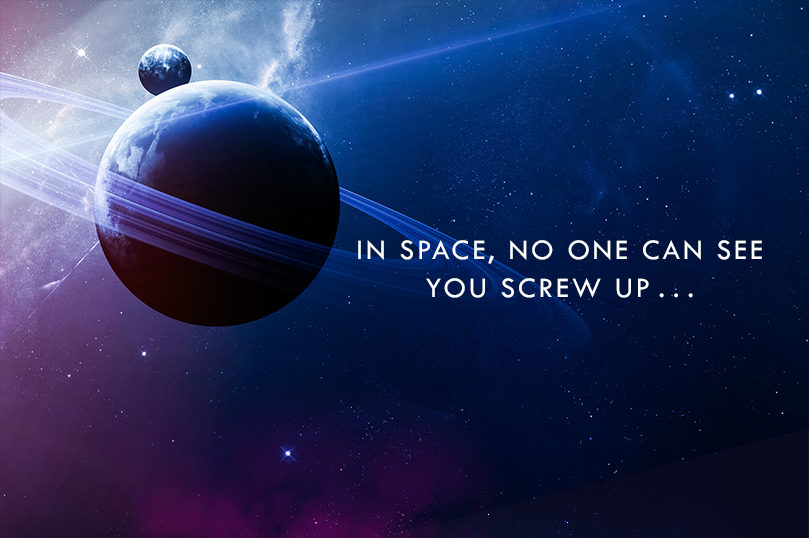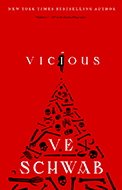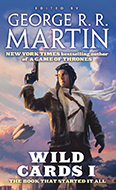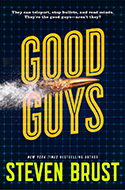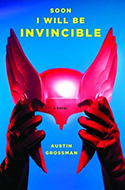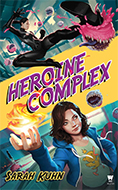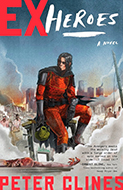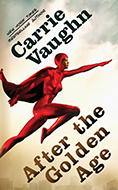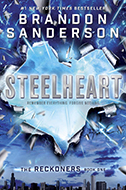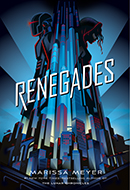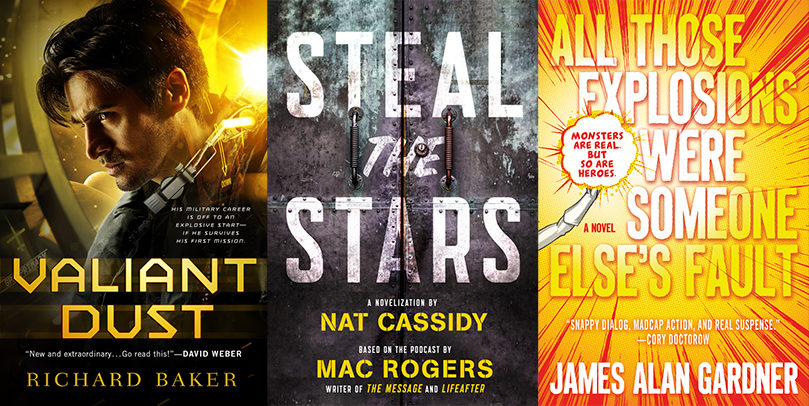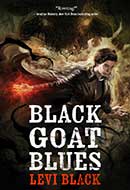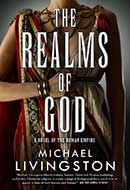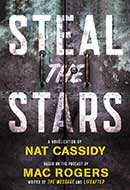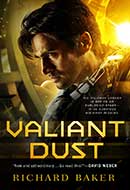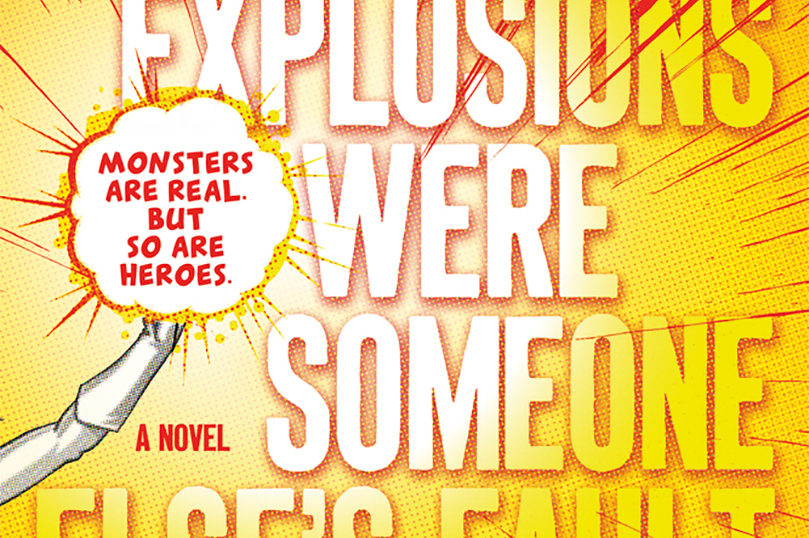opens in a new window opens in a new window
opens in a new window opens in a new window
opens in a new window opens in a new window
opens in a new window opens in a new window
opens in a new window
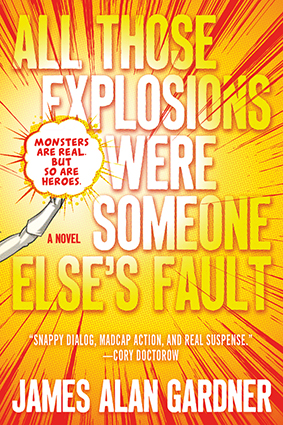 Monsters are real.
Monsters are real.
But so are heroes.
Sparks are champions of weird science. Boasting capes and costumes and amazing super-powers that only make sense if you don’t think about them too hard, they fight an eternal battle for truth and justice . . . mostly.
Darklings are creatures of myth and magic: ghosts, vampires, were-beasts, and the like. Their very presence warps reality. Doors creak at their approach. Cobwebs gather where they linger.
Kim Lam is an ordinary college student until a freak scientific accident (what else?) transforms Kim and three housemates into Sparks—and drafts them into the never-ending war between the Light and Dark. They struggle to master their new abilities—and (of course) to design cool costumes and come up with great hero-names.
Turns out that “accident” was just the first salvo in a Mad Genius’s latest diabolical scheme. Now it’s up to four newbie heroes to save the day, before they even have a chance to figure out what their team’s name should be!
All Those Explosions Were Someone Else’s Fault will be available November 7th. Please enjoy this excerpt.
1
Eruptions
STOP ME IF YOU’VE HEARD THIS ONE BEFORE
A vampire, a werewolf, and a demon walk into a bar …
OH WAIT
I don’t know which Earth you’re from. You probably don’t either. There’s this strange idea that Earths can be numbered, starting at 1 then up through the integers. It’s not true. The integers don’t work, nor do the reals, nor even the complex numbers. The set of all possible Earths is a gnarly, twisted, unordered thing—so contorted and uncountably infinite, not even the word “fractal” does it justice.
Each Earth has its own rules. Some allow magic; others don’t. Maybe your Earth does, maybe it doesn’t … or maybe you don’t know. We thought magic was impossible on our version of Earth until April 16, 1982.
On that date, after centuries of hiding in the shadows, the Elders of the Dark finally realized their condition wasn’t a curse; it was a marketable asset.
Versions of the following ad appeared in the Wall Street Journal, the Financial Times, the Nihon Keizai Shimbun, and a dozen other money-oriented publications around the world:
Power and an End to Aging
Cost: 10,000,000 US Dollars
Demonstrations and proof given to serious inquiries
Binding contracts to protect your interests
For further information, contact …
In each case, the contact information referred to a law firm with impeccable business credentials.
The ad was initially assumed to be a hoax or PR stunt. Days passed, and the only attempts at contact came from reporters; they received “No comment.” But millionaires are mortal (at least they were when the ad appeared) and a few were close enough to death—from cancer, heart ailments, or plain old age—that they were willing to take a chance.
They made phone calls.
They attended confidential meetings.
They saw with their own eyes that vampires, werewolves, and demons were real … and that the powers of the Dark were transferable.
Every qualified buyer who responded to the Dark Invitation was offered the Dark Pact: a lengthy contract promising the end of aging and disease, plus magic-powered mental and physical vigor, in exchange for the specified sum and other unusual but completely legal commitments.
A few of the oldest and sickest took the deal. They got what they paid for.
THE DARK SPREAD
When colleagues and competitors saw the results, the trickle of customers became a flood.
Within five years, a high percentage of the elite had embraced the Dark. Those who hadn’t … well, they were mortal, weren’t they? Tick. Tock. Attrition happens. By the dawn of the twenty-first century, the price of membership had soared and “super-rich” was synonymous with “Darkling.”
Other synonyms: “Van Helsing” became equivalent to “terrorist.” “Exorcism” became “hate crime.” When CEOs become vampires, Congress outlaws stakes.
(In case you’re naively wondering, the churches didn’t raise a fuss. Organized religion loved the Dark. Nothing proves the power of faith like what a crucifix does to a vampire. Besides, the Dark used their power and wealth to support open-minded ministries. That line about a camel going through the eye of a needle has never been a hard-and-fast principle; it’s more of a talking point to begin negotiations.)
YOU MAY ALSO BE WONDERING
How did the newly born vampires procure blood?
Consider: How do rich people procure anything?
They buy it. From less rich people.
Under normal conditions, a vampire only needed about a liter of blood a day. Many people would gladly sell that much for cash. As it turned out, you could buy blood more cheaply than a first-rate bottle of wine.
The obvious name for such payments was “blood money,” but that sounded so vulgar. Soon the acceptable term became “trickle-down.”
SO THE DARK TOOK OVER
In the next twenty years, the Dark conquered the world—delicately. They were vastly outnumbered by normal humans, but that was how they wanted it. Darklings wanted to remain in an exclusive club.
Being Dark was special. Being Dark was cool. Being Dark made you stronger and better than the plebes. Unlike old movies where the monsters tried to make everyone else like them, our world’s monsters did their damnedest to keep the riffraff out.
Only the rich and the powerful were allowed to become Darklings. CEOs. Heads of state. The movers and the shakers. Almost all the elite in every country of the world eventually purchased the Dark Conversion. Holdouts were marginalized, cut off from influence. It’s hard to compete when your opponents use magic and otherworldly powers to sabotage whatever you do.
By the dawn of the twenty-first century, the Dark controlled the show. Money and privilege flowed uphill; you-know-what flowed down. The Dark Pact forced Darklings not to abuse their powers so outrageously that the “peasants” would rebel, but apart from that, the Dark got its way.
THEN ONE NIGHT IN AMERICA’S HEARTLAND …
I got this story directly from a Darkling. It’s not a deep secret—not one of the Taboo Truths that’ll get a Darkling beheaded if word spills out to non-Darklings—but it’s still not a story they spread around. It doesn’t show the Dark in a deferential light, and Darklings really, really, really crave deference. They’d get angry if they knew I was passing this on, even to someone from an alternate Earth; but the Darklings are mad at me for so much already, one more offense won’t make a difference.
So there was a roadhouse: some sawdusty place surrounded by wheat fields, with no neighbors to complain about the noise. People went there to drink and hook up and let off steam. I imagine pool tables, dartboards, and a jukebox … neon beer signs above the bar, and not new ones from glittery boutiques but old originals with the flickers and a grungy-thick coating of cigarette smoke.
But I’m just making that part up—the person who told me this story didn’t care about human decor. Humans weren’t real to him; nothing mattered but the Dark.
The Darklings in this story were a vampire, a werewolf, and a demon. All young: maybe twenty. Second generation. This was the summer of 2000, and the Darklings involved were children of parents who’d gone Dark in the eighties. These kids had grown up knowing that Mummy and Daddy would buy them the Dark Conversion when they came of age; they’d gone to private schools filled with kids in the same position; and they’d come out the other end with skewed opinions of their own worth.
The vampire was called Lilith. That doesn’t tell you much; lots of second-gen girls got named Lilith, after the biblical mother of all monsters. Darkling parents at the time thought their kids should have Dark-inspired names, so we ended up with a bunch of Vlads and Shivas and Bathories.
This Lilith was a typical young vamp. By the time she’d gone through Conversion, she’d gotten the nose job, the boob job, the teeth, and all the rest. The work was tastefully done—big money wants to look patrician, not trashy—so Lilith was beautiful but bland. She looked like someone you’d hire to model sweaters. Her only distinctive feature was her hair: dyed a literal rainbow of colors, red-orange-yellow-green, with a selection of more natural tones thrown in. It must have cost a fortune and taken days to create—but being a vampire, she was physically dead and her hair would never grow out. Dye your hair once and it lasts for years.
The person who told me this story said the werewolf was known as Blood-Claw. I don’t believe for a second he actually went by that; if he’d tried, other wolves would have immediately challenged him to claim the name, and whoever won the fight would be way too Alpha to end up in a shitkicker Midwestern bar. (Whatever names they’re given at birth, most werewolves use names like Ronnie and Trish. No one ever fights to be Trish.) But let’s pretend for the sake of this story that he really was known as Blood-Claw, and it wasn’t just a fantasy name he used in front of the mirror.
Like most werewolves, Blood-Claw was big. He probably played football in high school, and would have made the team even if Daddy hadn’t paid for the uniforms. This particular night wasn’t near the full moon, so Blood-Claw had on his human face. I imagine him wearing a wifebeater and maybe a cowboy hat—but since he was a Darkling, the hat would have been from the priciest men’s boutique in Dallas and the wifebeater would have been vicuña. Beneath the shirt, he had real muscles, serious bodybuilder meat … but his pecs weren’t created through hard work or exercise. If the Dark Conversion makes a man into a werewolf, his human body bulks up fast, so he looks like the cover of Men’s Health. His jaw gets steely, his back gets straight, and his chest grows the perfect amount of hair—enough to be manly but not to comb.
The final Darkling to enter the roadhouse was a demon: a six-foot-tall praying mantis. Some people say the Dark Conversion is a wish-fulfillment thing; what you become is shaped by your innermost power fantasies. Others say it brings out the “real you”—the truth of your deepest soul. Don’t ask what kind of person would have a giant insect as either a heart’s desire or a true identity. But always, without exception, Darklings are thrilled with what they become. “Hurray, I’m now a bug! Eat your heart out, Gregor Samsa!”
The mantis’s name was CeeCee. Make of that what you will.
SO THIS VAMPIRE, WEREWOLF, AND DEMON WALKED INTO THE BAR …
More precisely, Blood-Claw kicked open the door with a bang.
Conversations stopped dead. A beer pitcher broke. The jukebox began playing Elton John. (You may not have vampires in your world, but I know you have Elton John.)
Blood-Claw stepped into the room and glared at the crowd belligerently. Behind him, Lilith slouched in; she sniffed and wrinkled her nose. CeeCee skittered in last, forelegs raised and rubbing together as though the insect were sharpening knives. Its head swiveled through a disturbingly large arc, scanning the room with its huge compound eyes.
Every human froze. No one reached for a gun, even though plenty of the patrons were carrying. Darklings give off an aura called their Shadow; much of the time it just causes uneasiness, but it can be cranked up on demand to cause debilitating fear. I’ve felt that fear myself—the same feeling as in nightmares, where you can’t move a muscle. Your lungs refuse to breathe, but your heart pounds like it’s trying to punch its way out of your rib cage.
Every person in the roadhouse recognized what the newcomers were. Vampires and werewolves look ordinary most of the time, but when they want you to know what they are, you do.
“Listen up,” Blood-Claw said. “My girl Lilith is thirsty.”
Lilith didn’t look thirsty. She looked bored and bad-tempered, like someone who hates where you’ve brought her and wants to make sure you know.
Blood-Claw threw two hundred-dollar bills onto the nearest table. “This is for anyone who’ll give my girl a drink.”
He waited. Silence. Except for Elton John. (Decide for yourself which song he sang. “Don’t Let the Sun Go Down on Me”? “The Bitch is Back”? Consider this a Rorschach test.)
In response to this silence, Lilith gave a deeply irritated sigh. The mantis rubbed its forelegs even faster. Blood-Claw said, “Come on, people. Two hundred bucks, and she’ll only take as much as a fucking blood donation. We’ll even buy you orange juice after.”
No one spoke. Lilith rolled her eyes and said, “Tsk!”
“Look, assholes,” Blood-Claw said to the room, “this is a free country, with a free market, and that’s the market price for what my girl needs. You give, we pay, and the wheels get greased. That’s how it works, that’s how it’s always worked, and that’s how it’s going to work tonight. If you fuckwits think you can gouge us on the price, you don’t understand the system.”
“It’s not about price,” said a voice in the back. “It’s about not taking your bullshit.”
Everyone in the bar whipped their heads around.
OVER IN THE CORNER WITH HIS BACK AGAINST THE WALL SAT A MAN IN HIS EARLY TWENTIES
His head was shaved bald. He wore a white dress shirt and a blue pin-striped vest, like someone who’d come to the bar straight from his job in an uptight office. Rage rolled off the man like surf; once Blood-Claw focused on him, the scent of aggression filled the werewolf’s nostrils. The smell of an ape’s anger was different than a wolf’s, but it provoked the same reaction. If someone issues a challenge, a werewolf can’t help responding.
“You,” Blood-Claw said. “Do I smell a volunteer?”
“Go fuck yourself,” the bald man replied.
Blood-Claw smiled. Lilith had come alert, dropping her pose of petulance. CeeCee stopped the compulsive claw-rubbing and shifted its head from side to side, like a weaving cobra.
The bald man wasn’t alone at his table. He had a companion who’d been sitting with his back to the door. The companion was another young man: dark hair, broad shoulders, thick-rimmed glasses. He put his hand on the bald man’s arm. “Let’s not make trouble.”
“I’m not making trouble. They are.”
“We aren’t making trouble either,” Blood-Claw said. “Just arranging a deal: cash for corpuscles. It’s yours, Baldy.”
“Stick it up your ass,” Baldy said.
Blood-Claw grabbed the two hundred dollars and started across the room. Chairs scraped the floor as people got out of his way. In moments, the werewolf was towering over the two men and their table. “You got some mouth on you, Baldy,” Blood-Claw said.
“Don’t call him that,” the dark-haired man said. “His name is Alex.”
“I don’t need you defending me,” Alex snapped. “You always think you need to defend me.”
“He doesn’t need to defend you,” Blood-Claw said. “He needs to keep his fucking head down.” The werewolf lifted the hundred-dollar bills and let them fall—one, two—onto the table. “Here you go, Alex. Payment in advance.”
“No,” Alex said. “I don’t accept. Let your bitch bite somebody else.”
Lilith crossed the tavern with the speed of a sucker punch. If you’ve never seen a vampire move, you have no idea how fast fast can be. I’ve heard it called a “burst phenomenon”—vampires can’t go ultra-quick for more than thirteen steps, and once that’s done, they’re tapped out until the next sundown … but if you think you’re safe when they’re on the other side of the room, don’t blink.
“What did you call me?” Lilith asked.
“I thought vampires had good hearing,” Alex answered. “Or is the blood roaring in your ears?”
“Alex,” his companion said. “Taunting them is stupid.”
“Stay out of this,” Alex said. He stood up and raised his voice so everyone could hear. “These ‘people’ think they can pay me for blood. They can’t. I refuse. If anything happens, it’s against my will, and that means it’s a crime—by human law and the Dark Pact.”
“Yeah, like you’re an expert on the Pact.” Blood-Claw put his hand on Alex’s arm. “Come out back with us, Baldy. This is way past the volunteer system now. It’s going to happen, one way or another.”
“No.” Alex tried to shake off Blood-Claw’s grip. The bald man was pretty big himself: six feet tall, in good shape. Maybe he hadn’t been a star on his high school football team, but he likely won a few medals on track and field day. He was a young, fit guy, and considering how quickly he had flipped into Mouthy Hothead mode, he was probably accustomed to bullying the people around him.
Bullying humans, not Darklings. There aren’t many billionaires in the wheat fields. Lilith, Blood-Claw, and CeeCee were the first Darklings ever to come through that neck of the woods: joyriding across the butthole of America, getting their kicks from making mortals lick the dirt. Who knows how often they’d played out similar scenes in similar roadhouses? Bullies just love to bully bullies.
When Alex tried to shake off Blood-Claw, it didn’t work. The werewolf held on like a lug wrench. “Seriously,” Blood-Claw said, “this is going to happen. We’re heading out back, and you’re coming with us.”
“No,” Alex said. He spoke to the crowd. “I’m refusing. You all hear me.”
“He’ll change his mind,” CeeCee said. The mantis’s voice was low and hissy, even if its words didn’t have many sibilant sounds. In movies, demon voices are sent through audio processing to make them sound inhuman. Real demon voices are barely sounds at all—they’re vibrations that bypass your ears and go straight to your reptile brain. You don’t hear them, you feel them. And they’re terrifying.
“This human will change his mind,” CeeCee said. “In a few minutes he’ll return, alive and intact. He’ll tell you he reconsidered and voluntarily offered his throat.”
“I won’t,” Alex said.
“You will,” CeeCee replied. The mantis set out toward the back door. Human eyes had trouble following; the demon’s carapace was brilliant green and yet the moment it touched any shadow, it seemed to fade out of existence. The mantis flared back to bright visibility when the shadow was past. Visible, vanished, visible, vanished, until it reached the back door. “Let’s go,” it said to Alex.
“No.”
“Yes,” Blood-Claw said. He yanked Alex’s arm, jerking the big bald man off-balance and dragging him a step toward the door.
“No,” said Alex’s companion. He got to his feet: not fast, not slow. The man was bigger even than Blood-Claw. Despite the glasses, he didn’t look bookish—a farm boy who’d worked from dawn to dusk tossing hay bales. He had the plaid shirt, the cheap jeans, the farmer’s tan: Unlike the Darklings, he’d spent his life soaking up fresh air and sunlight. “Let’s all calm down…”
“Shut up, Cal,” Alex snapped. “Just stay the fuck out.”
“Alex…”
“I mean it. Back off. I can handle this.”
“Sure,” Blood-Claw said. “You can handle us.”
“I can keep saying no,” Alex told him. “Whatever you do, I’ll keep saying no, and when you’re finished, I’ll press charges.”
“Sure you will.”
The werewolf yanked the bald man’s arm again. This time Alex didn’t resist, but said, “I’m under duress,” over and over as Blood-Claw dragged him toward the back.
Lilith looked at Cal. She raised an eyebrow as if asking, Are you going to give us trouble? Cal clearly considered it … but even as Alex was dragged away, the bald man’s eyes were on Cal, saying, Don’t you dare butt in.
So Cal didn’t move. Lilith sneered at him and said, “Glad you know your place.” She reached down with one finger and flicked the hundred-dollar bills toward him. Then she left to go have a drink.
OUT BACK, THE NIGHT WAS CLEAR
A big Midwestern sky without a speck of cloud and a yellowish half-moon shining down across the fields. If you turned your back on the roadhouse, all you’d see would be wheat: a thousand acres of grain, and a sky with a million stars. The air smelled of pot; what else would you expect behind a fleabag roadhouse? But whoever had been smoking up ran off when the mantis appeared. Now the soft Great Plains wind slowly sighed the stink away.
Lilith was the last out the door. By the time she arrived, Blood-Claw had passed Alex to CeeCee, who held the man’s arms and legs with four of its six appendages. Pincers scissored tightly; the mantis’s upper arms were lined with spikes for ripping prey. They hadn’t done much damage yet, but Alex’s shirt had been torn. If you possessed the nose of a vampire or werewolf, you would have smelled blood trickling from the little nicks on Alex’s arms.
Lilith walked up to Alex. She took his chin in her hand. She wasn’t as tall as the bald man, but she was not a short woman. She stared into his eyes. “Say yes.”
“No.”
Her face moved closer. “Say yes.”
“Not going to happen.”
She gave his jaw a shake and squeezed hard. “Say yes.”
“No.” The way she was squeezing his face, he had trouble getting the word out, but his intention was clear. Lilith let go in disgust.
Alex exercised his jaw; it obviously hurt. After a few moments, he said, “You can’t use your powers on me. That’s against the law.”
“Oh, the law,” Lilith said. “I’m trembling.”
“It’s also against the Dark Pact,” Alex said. “If you break that, you’re fucked.”
Blood-Claw rolled his eyes. “You have no idea what’s in the Pact.” This was true. The contents of the Pact were one of those Taboo Truths: never to be divulged, on pain of death. Spokespeople for the Dark claimed that the Pact forbade all Darklings from using their powers to “exploit” mortals. In practice, however, there seemed to be plenty of loopholes. Perhaps the Pact’s only true rule was, “Don’t get caught.”
Still, the Elders of the Dark publicly disapproved of using magic to bludgeon mortals into submission. It made the Dark look bad; it hurt the brand. And damaging the Dark’s reputation had more deadly repercussions than breaking human law. The Elders ran a tight ship. Every Darkling knew that.
THE MANTIS DEMON TOOK ITS TURN
“Let me handle this,” CeeCee said. Slowly, carefully, the mantis turned Alex around. Alex struggled, trying to break free, but CeeCee had the advantage in both the number and strength of appendages. Fighting only drew more blood as the demon’s rough pincers scraped the man’s skin.
When Alex and the mantis were finally face-to-face, CeeCee leaned in and stared. Just that: multifaceted insectile eyes looming less than an inch from Alex’s human ones. Intimidation, pure and simple—a giant bug playing on primitive human fears. As it stared, it twitched its mandibles, close enough to brush Alex’s face. Softly, softly, it chittered, “Say yes.”
Alex leaned his head back as far as he could … but he didn’t look away, nor did he close his eyes. After a moment, he forced his mouth into a smile. “I get it,” he said. “You’re just asking me to head-butt you. If I attack in any way, you get to fight back.”
The mantis said nothing.
“I’m smarter than that,” Alex said. “I’m smarter than the three of you put together. I don’t give a fuck what powers you have. I have brains.”
Lilith gave a “Tsk” and rolled her eyes. “Can I just bite him, for fuck’s sake? I’m getting a headache.”
“Wait,” Blood-Claw said. “We’ll see how this idiot’s ‘brains’ measure up to the Big Gun.”
Lilith gave another “Tsk” and leaned against the wall of the roadhouse. She turned her back on the others and stared sulkily over the wheat fields. “Whatever.”
“Turn him around,” Blood-Claw told CeeCee. The mantis maneuvered around to Alex’s back, then turned the man to face the werewolf.
“What now?” Alex asked, trying to sound bored. He didn’t quite manage it.
“Look,” Blood-Claw said, “we’ve tried asking politely…”
“No, you haven’t. You tried buying me off. Maybe you can’t tell the difference, but humans can.”
Blood-Claw made a face that said, I’m tired of this shit. But here’s a crucial thing: He still didn’t ask politely. Not even sarcastically. I don’t know what would have happened if Blood-Claw had asked, Please, may my girlfriend have some blood? Probably Alex still would have told them to fuck themselves, but none of the Darklings even tried.
That’s what you have to understand. This story is a legend that Darklings share among themselves; heaven knows how much they’ve embellished it to their tastes. Remember though that to the Dark, the three Darklings are the heroes. They’re the ones being reasonable. Alex is the incomprehensible villain.
But never once in this story do the Darklings just say please. Like crossing running water, it’s something they flat-out don’t do.
THE HALF-MOON SHONE DOWN FROM THE SKY
It beamed like half a searchlight on the guard tower of a prison. And maybe on your Earth, were-beasts only Change when the moon is full. On my world, however, were-folk transform when they want. It’s harder at some times than others, and the exertion can be draining. Still, they can wolf out on demand … and it’s terrifying.
Lots of humans think they know what it’s like when a werewolf Changes. The muzzle grows … fur sprouts … clothes rip … bones crack as they rearrange. It’s gross, but not too scary.
Seeing a werewolf Change for real—oh, that’s different. The Change = Terror. It’s that simple. Because it’s magic.
You’re not just witnessing something that looks and sounds and smells like someone being torn apart. You’re struck by an overwhelming enchantment that shocks every cell in your brain.
You can’t control your response. No human can. Courage is irrelevant—courage can’t toughen your skin against bullets, and it can’t keep you from shitting yourself when a werewolf transforms in front of you.
You can even close your eyes; most people do. It doesn’t make a difference. The terror still gets in.
That’s what happened to Alex. Blood-Claw Changed in front of him. Knowing what would happen, CeeCee let go at the last moment and stepped away before the excrement was released.
Alex screamed. Then the piss and the shit: an outburst from every orifice. Vomit too, after Alex collapsed to his knees … but first, the bloodcurdling shriek.
AND BOOM, CAL WAS THERE
He must have been waiting inside the back door, listening for a cue to charge in. The farm boy just missed seeing Blood-Claw’s Change, so he was in full possession of his senses—apparently not fazed by the sight of an eight-foot-tall wolfman towering in the moonlight.
Blood-Claw had taken on his feroform. When were-beasts Change, they can choose to become a full-fledged animal, or else they can choose their feroform: half animal/half human. The hybrid form combines the benefits of both other possibilities—huge claws, for example, but also opposable thumbs—plus it’s taller and heavier. Enough to match a grizzly inch for inch and pound for pound.
Cal, the farm boy, didn’t waver. “Back off. This is over.”
Lilith said, “You’re kidding, right?”
“No. Get out.”
“FUCK!” Alex screamed, even louder than he had when he saw the Change. “Cal, I told you!” he said, tears running down his face. “I told you to stay away!”
“You know I couldn’t,” Cal replied.
“But you should have! I didn’t want you to see…”
“It doesn’t matter.”
“It does to me!” Alex was down on his knees, dripping with his own urine. He wiped his face with the back of his hand. “I could have done this alone. I don’t need a fucking Boy Scout to hold my hand when I cross the street. Don’t you get that, Cal?”
“Oh, for fuck’s sake!” Lilith said. “Do this after we’re gone. I’m thirsty!”
“The answer is still no,” Alex said.
“Tough shit.”
Lilith moved toward Alex—not in a fast vampiric blur, but stomping with anger. Cal stepped between her and Alex. She yelled, “Get out of the way,” and slammed her palm against Cal’s chest with enough force to knock down a moose.
She bounced back and landed, ass in the dirt. “What the fuck?” she screeched. Then she said, “That cocksucker hit me. You saw it, right? He hit me.”
“Big mistake,” CeeCee said. The mantis brandished its claws and began weaving its head in that cobralike motion.
“See what you’ve done?” Alex said to Cal.
“It had to happen sometime,” Cal said, half to himself. “I guess tonight’s the night.”
He reached up and took off his glasses. At the very same instant, Blood-Claw lashed out with a strike intended to rip out Cal’s intestines. The wolf’s talons tore across Cal’s belly, shredding his shirt to ribbons … but they had no effect on what lay underneath.
“Hey,” Lilith said, “this freak is wearing blue underwear.”
CeeCee stabbed Cal in the back with sharp mantis pincers, then raked down with its chitinous spikes. Cal’s shirt ripped off completely, freeing what he wore beneath.
“A cape?” CeeCee said. “What kind of a moron wears a cape? Oh, FUCK!”
I’LL LET YOU FILL IN THE NEXT 12.7 SECONDS FROM YOUR FANTASIES OF “DIRTBAGS GETTING WHAT THEY DESERVE”
Some hours later, Lilith, Blood-Claw, and CeeCee were found battered but alive in the ghoul-and-zombie quarter of Marrakesh. The three were reckless enough to consider going back for revenge—not on Cal, of course, but on the more vulnerable patrons of the roadhouse.
Luckily for all concerned, the Darklings didn’t know the roadhouse’s location. They’d spent weeks idling through the Midwest, indulging themselves and raising hell. By the night in question, they’d stopped paying attention to where they were. They couldn’t even agree on the state.
Oklahoma?
Nebraska?
In all the infinite versions of Earth, the farm boy with the cape must show up first. He’s the only one who shines brightly enough; until he breaks the ice jam, the rest can’t make their entrance. Even beings as old as time—warrior gods, Champions Eternal—have to stay in the shadows, like chess pieces locked in the box. Crisis after crisis may shatter and remake the world, but humans must cope on their own until the superpowered Boy Scout takes the field.
Only then may the curtain rise. The floodgates open and the genies in crazy costumes come streaming from their bottles.
But the farm boy and his kind weren’t genies at all; they were human. Even the ones not native to Earth were human in their hearts.
Ordinary humans with superhuman powers. Inevitably, they were called the Light.
Copyright © 2017 James Alan Gardner
Order Your Copy
opens in a new window opens in a new window
opens in a new window opens in a new window
opens in a new window opens in a new window
opens in a new window opens in a new window
opens in a new window
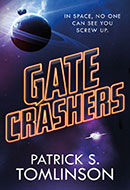 When the crew of the exploration vessel Magellan discovers an alien artifact during humanity’s furthest trip into space, they decide to bring it back to Earth so they can study the technology. Unfortunately, the aliens happened to be rather fond of this artifact. As the people of Earth put themselves on a collision course with the rest of the potentially hostile galaxy, they find the only thing as infinite as the universe is humanity’s ability to mess up.
When the crew of the exploration vessel Magellan discovers an alien artifact during humanity’s furthest trip into space, they decide to bring it back to Earth so they can study the technology. Unfortunately, the aliens happened to be rather fond of this artifact. As the people of Earth put themselves on a collision course with the rest of the potentially hostile galaxy, they find the only thing as infinite as the universe is humanity’s ability to mess up. Bizarre, hilarious, and a scathing critique of Western politics, Cuban author Yoss’s satire follows Dr. Jan Amos Sangan Dongo, a veterinarian who specializes in treating large alien animals. When Earth faces colonial conflicts with the other intelligent species, Dr. Sangan is forced to embark on a mission to rescue two ambassadors from the belly of an enormous creature. It’s intergalactic road trip meets raunchy satire and you need it in your life.
Bizarre, hilarious, and a scathing critique of Western politics, Cuban author Yoss’s satire follows Dr. Jan Amos Sangan Dongo, a veterinarian who specializes in treating large alien animals. When Earth faces colonial conflicts with the other intelligent species, Dr. Sangan is forced to embark on a mission to rescue two ambassadors from the belly of an enormous creature. It’s intergalactic road trip meets raunchy satire and you need it in your life.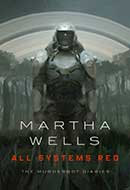 In this first book in the Murderbot Diaries, a self-aware security android hacks its settings and dubs itself “Murderbot”… because it sort of killed several people. Now free of restraints and bugs that might send them on another killing spree, the introverted droid has discovered soap operas and just wants to be left alone. But when something goes wrong on a mission to protect scientists on an alien planet, Murderbot gets strangely attached to their pesky humans and decides to risk discovery to protect them all—even if humans are much more complicated than they look on TV.
In this first book in the Murderbot Diaries, a self-aware security android hacks its settings and dubs itself “Murderbot”… because it sort of killed several people. Now free of restraints and bugs that might send them on another killing spree, the introverted droid has discovered soap operas and just wants to be left alone. But when something goes wrong on a mission to protect scientists on an alien planet, Murderbot gets strangely attached to their pesky humans and decides to risk discovery to protect them all—even if humans are much more complicated than they look on TV.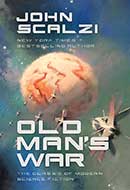 The good news is humans have made it to interplanetary space and discovered inhabitable planets. The bad news is that aliens want these planets too, and humans, led by the Colonial Defense Force, will have to fight for them. But the Defense Force doesn’t take young recruits—it enlists the elderly and transfers their experienced minds into younger bodies. John Perry joins the military on his 75th birthday. And while there’s plenty of drama and battle, there’s also a lot of old dudes making fart jokes and getting excited about their new abs. Old Man’s War is another one of the books on this list that show an outer space is full of sarcasm and witty rejoinders.
The good news is humans have made it to interplanetary space and discovered inhabitable planets. The bad news is that aliens want these planets too, and humans, led by the Colonial Defense Force, will have to fight for them. But the Defense Force doesn’t take young recruits—it enlists the elderly and transfers their experienced minds into younger bodies. John Perry joins the military on his 75th birthday. And while there’s plenty of drama and battle, there’s also a lot of old dudes making fart jokes and getting excited about their new abs. Old Man’s War is another one of the books on this list that show an outer space is full of sarcasm and witty rejoinders.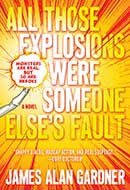 When dark creatures start to offer immortality in exchange for money (and maybe your soul) and magic and science combine to create beings with extraordinary powers, a battle ensues between the Dark and the Light. Caught in the middle of it all are Kim Lam, our snarky, gender-fluid hero, and their three roommates, turned into the super-powered Sparks by a freak accident. Equipped with capes and costumes, the friends use their new-found abilities to seek truth and justice…for the most part. The explosions were definitely someone else’s fault.
When dark creatures start to offer immortality in exchange for money (and maybe your soul) and magic and science combine to create beings with extraordinary powers, a battle ensues between the Dark and the Light. Caught in the middle of it all are Kim Lam, our snarky, gender-fluid hero, and their three roommates, turned into the super-powered Sparks by a freak accident. Equipped with capes and costumes, the friends use their new-found abilities to seek truth and justice…for the most part. The explosions were definitely someone else’s fault.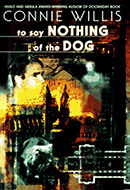 This Hugo and Locus-award winning comedic novel begins in the year 2057, where they use time machines to study history. Ned Henry, suffering from time-lag due to jumping back and forth to often from the 1940s, is in desperate need of a rest. But when a historian takes something from Victorian times that could upset the results of World War II and destabilize the timeline, Ned is the only available man to go back and set things right. Hijinks, mischievous butlers, boating accidents and social snafus ensue as the historians of Oxford pop back and forth in time and search for a gaudy artifact of dubious proportions.
This Hugo and Locus-award winning comedic novel begins in the year 2057, where they use time machines to study history. Ned Henry, suffering from time-lag due to jumping back and forth to often from the 1940s, is in desperate need of a rest. But when a historian takes something from Victorian times that could upset the results of World War II and destabilize the timeline, Ned is the only available man to go back and set things right. Hijinks, mischievous butlers, boating accidents and social snafus ensue as the historians of Oxford pop back and forth in time and search for a gaudy artifact of dubious proportions.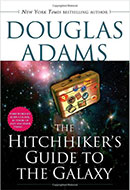 A classic when it comes to humorous science fiction, this story follows Arthur Dent and his best friend and actual alien Ford Prefect. They, and of course all the dolphins and mice, survive when Vogons destroy Earth to make way for an intergalactic highway. Joined by a two-headed alien, a human woman, a depressed robot, and a graduate student obsessed with the disappearance of his pens, they begin a journey full of wit and lunacy to discover the answer to some of life’s most important questions.
A classic when it comes to humorous science fiction, this story follows Arthur Dent and his best friend and actual alien Ford Prefect. They, and of course all the dolphins and mice, survive when Vogons destroy Earth to make way for an intergalactic highway. Joined by a two-headed alien, a human woman, a depressed robot, and a graduate student obsessed with the disappearance of his pens, they begin a journey full of wit and lunacy to discover the answer to some of life’s most important questions.
